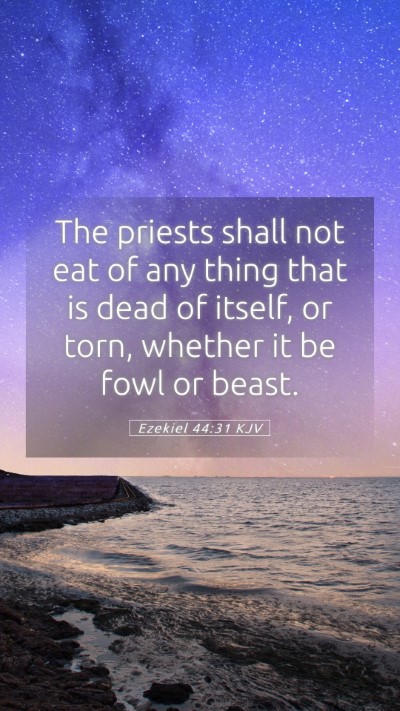Ezekiel 44:31 - Understanding the Meaning and Interpretation
Ezekiel 44:31 states: "The priests shall not eat of anything that is dead of itself, or torn, whether it be fowl or beast."
This verse comes from a section of Ezekiel which outlines the duties and regulations pertaining to the priests. The regulations emphasize cleanliness and the sanctity required of those who serve God.
Bible Verse Commentary
According to Matthew Henry, this passage highlights the divine standards for priests. The prohibition against consuming animals that were dead (i.e., not properly slaughtered) stresses the importance of maintaining purity within the priestly order. The priests served as mediators between God and the people, and their actions were expected to reflect holiness and reverence towards God.
Albert Barnes adds that this command invites reflection on the character of God as holy and separate from corruption and decay. The priests' dietary restrictions serve as a metaphor for the spiritual nourishment they are expected to pursue. Just as they are to avoid physical impurity, they are to seek spiritual sustenance and avoid anything detrimental to their service.
In the writings of Adam Clarke, the emphasis is placed on the role of the priests as examples for the community. By adhering to these laws, the priests exhibit a commitment to God’s standards which in return encourages the people to do the same. Clarke points out that the relevance of this command extends beyond Ancient Israel and speaks to the broader theme of holiness in the lives of all believers.
Application of the Verse
The practical application of Ezekiel 44:31 can be understood in the context of our daily lives. Just as priests were called to maintain purity in their dietary choices, believers today are called to uphold spiritual purity. This may manifest in various ways—through the media consumed, the company we keep, and the moral and ethical decisions we make.
Historical Context of the Verse
The dietary laws outlined in Ezekiel were part of the broader Levitical laws given to Israel. They served not only to promote health and hygiene but also to distinguish the people of Israel from surrounding nations. This specific verse, therefore, can be seen within the context of God's covenant with His people and the rituals that preserved that relationship.
Bible Cross References
- Leviticus 7:24 - Discussing the prohibition of eating the flesh of animals that died naturally.
- Leviticus 11:4-8 - The dietary laws concerning clean and unclean animals.
- 1 Peter 2:9 - Calling believers a royal priesthood, emphasizing holiness.
Conclusion
To summarize, Ezekiel 44:31 serves as a profound reminder of the standards set by God for those dedicated to His service. It underscores the expectation for physical and spiritual purity and encourages believers in their pursuit of holiness. The principles derived from this passage continue to hold significance for modern-day interactions with both God and one another.


